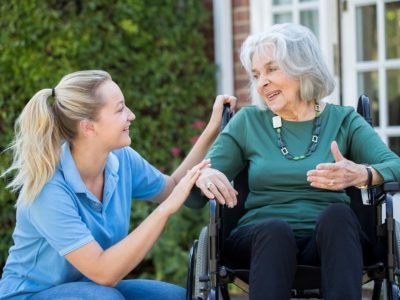The World Health Organization (WHO) defines social determinants of health as: “the conditions in which people are born, grow, work, live, and age, and the wider set of forces and systems shaping the conditions of daily life.”
It’s estimated that up to 80 percent of health outcomes are attributable to social determinants of health, which are generally divided into five categories:
-
- Economic stability: Poverty, employment, food security, housing stability
- Education: High school graduation, higher education, language and literacy, early childhood
- Social and community context: Social cohesion, civic participation, discrimination, incarceration
- Health and healthcare: Access to healthcare and primary care, health literacy
- Neighborhood and built environment: Access to healthy foods, quality of housing, crime and violence, environmental conditions
Another way of looking at social determinants of health is by dividing them into categories that correlate with the amount of influence they have on your health:
- 10% physical environment (air and water quality, housing, transit)
- 20% clinical care (access, quality)
- 30% health behaviors (diet, exercise, tobacco use, alcohol and drug use)
- 40% social and economic factors (education, employment, income, community safety, family and social support)
Doctors and public health researchers now understand more than ever the role these outside factors play in the health of not just the community, but the individuals within it.
SDOH-Informed Care
“Care that is informed by SDOH assesses the way a person lives, works, worships, and plays,” explains Dr. Sydney Ross-Davis, Chief Medical Officer at Zing Health “It looks at the person’s neighborhood, how many people live in their home, the support systems in place—financial, legal, and health—and whether people have transportation options and access to food and care.”
For example, if a person doesn’t have the tools to manage their healthcare because of their literacy, financial state, or isolation, it doesn’t matter how many doctors are in the area. And if someone lives where they can’t go out safely to buy fresh groceries or can’t visit a doctor’s office because there’s no way to get there, that’s going to affect their health.
Zing Health’s mission is to address the social determinants of health that affect the communities we serve. Our unique, culturally informed model of care considers your needs both inside and outside of your doctor’s office.
“Our members can take advantage of the numerous resources that we’ve identified within the community to help, either from our years of experience or from organizations we are partnering with,” said Dr. Eric E. Whitaker, CEO of Zing Health. “Our goal is to assess the member clinically and provide them with options that can improve their lives.”
Why the Health Assessment Matters
New Zing Health members are asked to participate in a health assessment, which helps the Zing Health team understand not just the member’s medical and mental health history and needs, but also the other factors that may affect their health. This may include determining if they have a fall risk, whether they’re able to perform the activities of daily living, or even if they can balance their checkbook.
We may ask, “Do you live alone? Do you have somebody to help you get your groceries? How are you getting your medicine? Are you able to get to the outside meetings that you need to go to?” We identify barriers to any of these or other challenges in their lives.
For example, if they don’t feel safe going to the pharmacy, we will help them get enrolled in our mail order prescription program. If they don’t have a ride to the doctor, we can arrange transportation. If they don’t understand how to manage their chronic condition, we will offer them education. If they are living in unsafe conditions, we will connect them with community resources to improve their living situation.
“If this assessment comes up short in one of these social determinants of health, and we have community-based resources to bridge that gap, we ask the member if they’re interested in participating in those kinds of positive activities,” says Dr. Ross-Davis. “Sometimes, just knowing someone cares is enough for them to take that next step and get the help they need.”
Real Conversations for Real People
“Our goal is to have real conversations with people in plain language—very little doctor talk, very little insurance talk,” she continues “That’s a personal touch that Zing Health prides itself on, and one that has been part of our philosophy since Day 1.”
At Zing Health, we will do whatever we can to make sure seniors stay healthy in whatever environment they are living in. We are here to make a difference.
Content Source by “Zing Health”








Comments